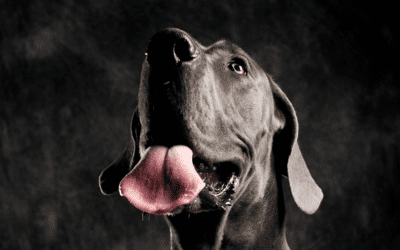Article originally by Sarah-Jane Molier
If your dog is coughing, it’s only natural that you’d be concerned. Dogs can cough for a variety of reasons, some more serious than others. Let’s take a look at some possible causes of coughing in dogs, and what you need to do.
Why is my dog coughing?
Kennel Cough
Kennel cough is a very common cause of coughing in dogs since it is very contagious. The name is slightly misleading since dogs don’t need to have been in kennels to catch it. Dogs are at greater risk of catching kennel cough in areas where dogs mix, such as kennels, parks or group dog walks. However, it is airborne, so they only need to meet one infectious dog in order to catch it themselves!
Kennel cough tends to cause a distinctive dry, hacking or honking cough. It may sound like something is stuck in your dog’s throat. Luckily, dogs with kennel cough tend to recover in 2-3 weeks, without any treatment.
Tracheal collapse
Tracheal collapse is when the rings holding the windpipe open collapse, meaning there is less space for air to travel to and from the lungs. It is more common in small or toy breeds and overweight or obese dogs. Tracheal collapse usually causes a honking cough (a bit like a goose), which is often worse when on the lead. It can cause coughing fits, which the dog may struggle to calm down from. It is also often the culprit of a dog coughing when excited or anxious.
Pneumonia
Pneumonia is inflammation of the lungs and airways, usually caused by a bacterial or viral infection. It can also be caused by a fungal infection, or from breathing foreign material into the lungs. Pneumonia usually causes a deep cough, reduced appetite and lethargy (a lack of energy). It may also cause a fever.
Bronchitis
Bronchitis is inflammation of the airways, which can be caused by a bacterial infection, viral infection, or allergies.
Chronic (long-term) bronchitis is a very common cause of chronic coughing in dogs; and is most common in elderly, small breed dogs. Dogs with chronic bronchitis are usually healthy, apart from the cough. It can also be known as chronic obstructive pulmonary disease (COPD).
Lungworm
Lungworm is a very serious disease caused by a parasitic worm. Sadly, it can be fatal. Dogs usually get lungworms by eating (or licking) slugs or snails. They ingest the worm, which then lives in the heart and blood vessels, causing a wide variety of symptoms, including coughing.
Airway foreign body
If your dog has breathed in a foreign object or matter, this can lead to a cough, since that is the body’s way of trying to expel it.
Heart disease
Heart disease can cause a cough, usually alongside faster breathing and reduced ability, or willingness, to exercise. Heart disease can cause a cough when the heart enlarges, pressing on the airways. Heart disease can also cause fluid to build up in the lungs (pulmonary oedema), which causes a cough. Your vet may suspect heart disease if your dog is coughing at night or coughing when laying down.
Laryngeal paralysis
The larynx, or voice box, is the tube that allows air to pass from the throat to the windpipe. It is supported and held open by laryngeal muscles. Laryngeal paralysis happens when the nerves controlling the laryngeal muscles become weak or paralysed. This causes the muscles to become floppy, so the cartilages collapse and the tube narrows or closes. This causes coughing; often after exercise, eating and drinking. It can also cause noisy breathing, reduced exercise tolerance, panting and changes to the sound of the bark. It usually affects middle-aged and older medium and large breed dogs.
This list is not exhaustive, and there are other (less common) possible reasons for why your dog is coughing, such as cancer. Next, let’s look at when you should be concerned about your dog’s cough.
When to call the vet
If your dog develops a cough, it’s safest to have them checked over by your vet. If your dog has a cough and any of the following, it’s definitely time for a trip to your vet:
- Lethargy, or struggling with exercise
- Reduced appetite
- Seeming unwell in themselves
- A cough which is getting worse, or not getting better
A continuous cough
Difficulty breathing or a faster breathing rate than normal
Coughing up blood or white foam
Collapse.
You know your dog better than anyone. Trust your gut and call your vet if you have any concerns.
Diagnosing the cause of the cough
Your vet will start by asking you some questions and examining your dog. They may then have enough suspicion to trial some treatment. In most cases of kennel cough, no treatment is needed. They may wish to run further tests, which may include:
Bloods
X-rays
Bronchoscopy (using a special camera to look inside the airways)
Taking a sample of fluid from the airways for testing
Echocardiography (an ultrasound scan of the heart)
Advanced imaging (such as a CT scan)
Your vet will be able to talk you through which tests your dog needs.
Treatment for coughing in dogs
The treatment for coughing will depend on the cause, and may include any of the following:
Targeted treatments
For example, a bacterial infection would require antibiotics. Lungworm, fungus and heart disease would all need specific medication, targeting that particular disease.
Bronchodilators and/or steroids
Bronchodilators are medications which help open the airways, by relaxing the muscles in the airways. This makes breathing easier.
Steroids are anti-inflammatory drugs, which help to open up the airways by reducing inflammation.
Bronchodilators and steroids can be useful in conditions such as tracheal collapse, allergies, chronic bronchitis and laryngeal paralysis. They can be given by mouth or breathed in via an inhaler. Using inhaled medications is useful for making sure the drugs reach the desired area (the airways), and they can reduce the side effects compared with giving the medication by mouth. Giving medications by inhaler also means a lower dose can be given than by mouth. As an example, steroid inhalers are considered relatively safe for long-term use, whereas long-term steroids given by mouth are more likely to cause unwanted side effects.
Lifestyle changes
Lifestyle changes such as weight loss, using a harness instead of a collar and feeding soft food can make a big difference too.
Don’t forget that prevention is better than cure! While many causes of coughing in dogs can’t be prevented, some can. Make sure your dog is up to date with their vaccines (distemper and kennel cough) and lungworm preventatives.
Take home message
Coughing in dogs is a common problem, with many possible causes. While many coughs will be relatively harmless and resolve on their own, some causes are more serious than others. It’s important that you call your vet for advice if you have any concerns about your dog’s cough.




